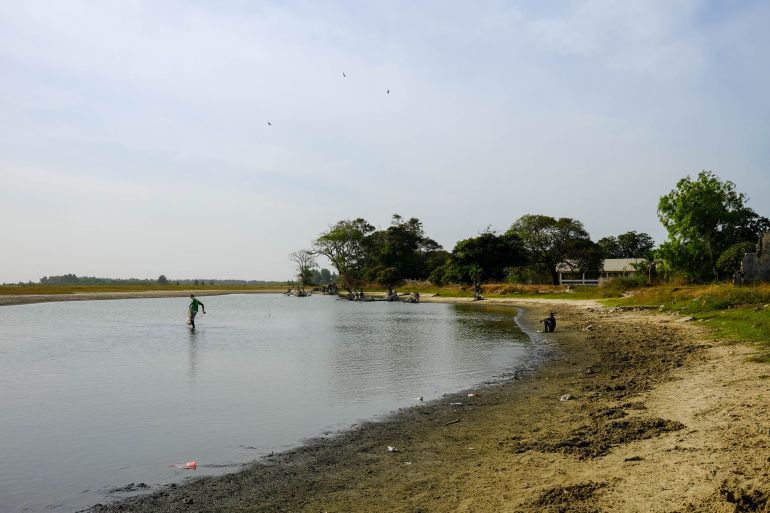Communities in Senegal struggle with rising sea levels brought on by climate change, which disturb habitats and endanger livelihoods. Senegalese island of Diogué – Cherif Diatta used to play football as a kid on a beach on Diogué, an island in southern Senegal at the Casamance River’s mouth. Nearly fifty years later, vessels are still afloat in the same location.
Diatta, 66, who is currently the island’s leader, stated, “And it [the seawater] keeps moving faster and faster.”
There are apparent effects from the water’s erosion of Diogué’s coastline.
Mangroves are replacing rice fields as residents move further inland. The beaches are littered with dead trees, their rotting roots suffocated by the encroaching saline groundwater. Locals were forced to relocate the island’s primary school and abandon the major cistern when seawater began to seep in.
Standing on the beach a short distance from the water, Diatta said, “This spot where we are sitting now, it’s not sure it will be there tomorrow.”
According to experts, rising sea levels caused by a changing climate are the cause of the continuous and expanding retreat of Diogué’s beachfront.
Glaciers and ice sheets melt more quickly than they accumulate fresh snow as global temperatures rise, partly as a result of the increased production of greenhouse gases that trap heat in the atmosphere. This increases the amount of water entering the ocean, causing tides and waves to be stronger and causing coastal erosion, flooding, and saltwater infiltration.
Despite contributing only approximately 2% of global emissions, West Africa, where Senegal is located, is one of the world’s most vulnerable regions to climate change’s effects, including rising sea levels.
The 718km (446 mile) coastline of Senegal is crucial to its social structure and economy. The majority of the population and economic activities in the country, including fishing and agriculture, are concentrated in this Atlantic Ocean-exposed region, which also accounts for approximately 70% of the nation’s GDP.
However, a survey by the Journal of Coastal Erosion found that between 2014 and 2018, the low, sandy shorelines shrank by up to 3m (10 ft). The retreat in Diogué over the previous ten years was roughly 50m. (164 feet). The World Bank estimates that the cost to the country is more than $500 million per year because to the environmental changes and livelihood threats brought on by this intrusion.
The process of self-destruction has been accelerated by human development, according to Boubou Aldiouma Sy, a geography professor at Gaston Berger University in Saint-Louis.
Sy continued ominously, “Places like Diogué will vanish.
The majority of people in Diogué depend on fishing, just like people do throughout the rest of Casamance. However, as the seawater spreads, it destroys vegetation, which in turn has an impact on a number of fish species that depend on ecosystems like mangroves for spawning and breeding.
The production of agriculture has also been affected. The groundwater has become too salty as a result of the ocean seeping into the soil, making it unsuitable for growing food like rice, which is an important part of the nutrition of families throughout the region.
According to PAPSENPAIS, an organization focusing on Senegal’s agricultural development, a decline in the local production of the traditional staple has aggravated food insecurity and poverty despite the fact that it is primarily intended for domestic consumption and not for sale.
According to the Senegalese National Network of Development Actors, saltwater kills 25 to 30 percent of the rice fields along the Casamance River, from the regional capital Ziguinchor to Sédhiou, farther east, each year.
According to Bruno Bouyoyo Diatta, the traditional chief of Kabrousse, next to the popular tourist site of Cap Skirring, where paddy fields have been replaced by dry areas, “water advances, and poverty along with it.”
According to him, half of the hamlet has stopped growing rice during the past forty years. The problem is made worse by the fact that many young people choose to migrate to urban regions or work in the vacation resorts in the area rather than working in the fields.
Those who remain make an effort to adapt and defend themselves.
Building barriers to impede the incursion of seawater is one of the bottom-up initiatives that the inhabitants of Kabrousse have started.
All we have is farming, said Bouyoyo Diatta.
Patrick Chevalier, a professor of economy at Ziguinchor University, has also studied methods developed in Australia and Canada to address difficulties related to erosion in Diogué.
In order to trap the sand and keep it from washing away, he began an experiment in 2019 with a group of local volunteers that involved inserting coconut leaf branches at the foot of wooden sticks planted along the beach.
And it succeeded. Three years later, the beach in some areas of the island had grown up to 30 meters (100 feet) long.
Chevalier has today secured funding from the Senegalese government to extend the project over a larger area in partnership with local authorities.
As part of the same strategy, local farmers whose rice paddies dried up have turned to oyster cultivation rather than rice farming.
It’s crucial to consider integrated management, which entails adapting the landscape to preserve some regions while developing others, according to Chevalier. Being proactive rather than passive is key.
He did admit, though, that these initiatives fall short of meeting the enormous challenges brought on by sea level rise.
Chevalier foresaw a worsening of the situation. “Though it will get harder over time, we need to organize the region today so that it is prepared to handle it. It will be a catastrophe in 20 years if we don’t take action now.







